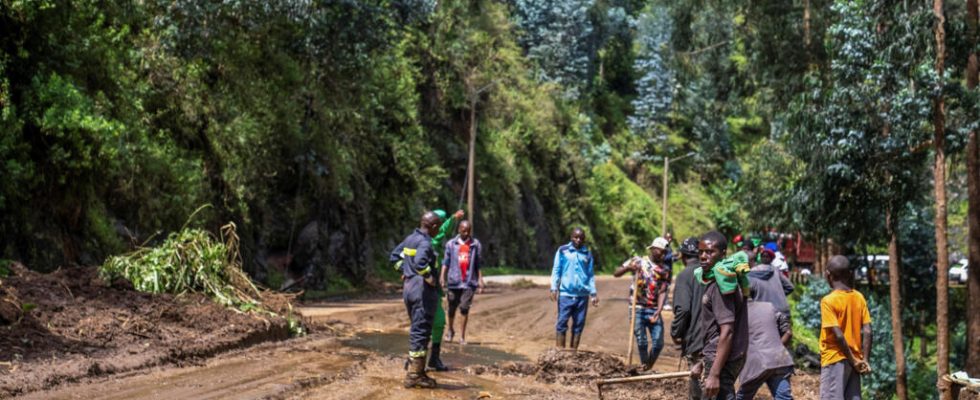In Rwanda, the toll from Tuesday’s floods rose to 131 dead, 94 injured and more than 5,500 homes destroyed. Among the hard-hit infrastructure, some roads are completely impassable. This makes cleaning complicated, as well as the return of some inhabitants. In the Western Province, on the portion between the towns of Rubavu and Rutsiro, traffic is gradually picking up.
With our special correspondent in Rubavu, Lucie Mouillaud
Three days after the floodsJean-Baptiste is eager to return to his home in the district of Rutsiro:
” I left for Gisenyi on Tuesday and the rain fell. So I waited for things to work out to go home. Where I live, there are landslides, it destroyed the houses of several neighbours. But in my house we are still alive and we thank God for it. »
But the journey will be longer than expected: the taxi, stuck in one of the many sections of the road still covered by landslides, forces passengers to get out. Among them, Sosten:
” We got there and the taxi slid it almost fell into the ditchexplains this carpenter who returns for the first time to his workshop. You see that the mud prevents us from rolling. So we had to stop to see if we can remove it. »
On many passages, the tarmac is still completely covered by earth and the mud that fell from the surrounding hills. Rubble, rocks, trees clog some sections of the tracks: construction workers are busy cleaning the road.
” For us, what was difficult was accessing the road, explains a worker. Now the road is functional at 60 %. I think Monday it will be cleaned completely, if there is no new bad weather. »
According to government figures, 9 out of 14 national roads damaged by the weather have been restored.
The colossal work of cleaning buildings
In the meantime, the cleaning of the buildings continues, to restore them to working order. A colossal work in the areas most affected by bad weather, especially in the diocese of Nyundo, a few kilometers from the city of Rubavu.
In single file, a group of parishioners carry sacks filled with mud from the church. In the diocese, everything was devastated by the mudslides: furniture, computers, archives, equipment from the carpentry and sewing workshops.
” The priority now is cleanliness, being able to clear the mudexplains the priest and bursar Etienne Izimenera. And after that, we’ll try to clean the walls, from the inside out, and after that, we’ll see. Another step would be to look for materials and machinery to continue the work. »
In the minor seminary, several hundred boarding children were transferred to new temporary dormitories while the buildings were cleaned. A long-term job, as the water again flooded the buildings the day before, two nights after the first rains.
For the rector of the minor seminary, Father Jean-Bosco Nyribakwe, the important thing is to secure the area: “ Tonight, what we are going to do, we have already ordered bags, we are going to put sand, and with that, we can temporarily block, or at least disorient the water. »
Outside the minor seminary church, the Bibles lie on the ground, completely destroyed by the mud. The rector hopes that everything will be cleaned and ready within a week, so that the students can return to their dormitories.
Residents now want to try to clean up flood-ravaged buildings – Report
► Read also : Rwanda: after the floods, thousands of refugees try to shelter in camps
